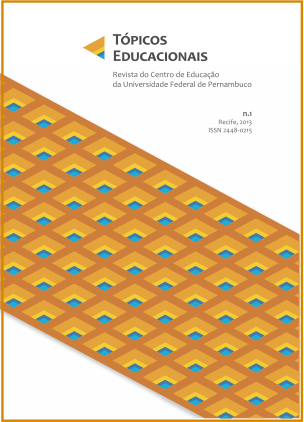O TRABALHO PEDAGÓGICO COM RECURSO AO B-LEARNING NO ENSINO SUPERIOR
Abstract
Neste artigo apresentam-se os resultados de um estudo realizado com o objetivo de compreender as razões do recurso às plataformas LMS e os efeitos gerados na docência. Os dados foram recolhidos através de entrevistas realizadas a um grupo de professores que receberam o prémio “Excelência e-learning U.P” e foram interpretados pela técnica da análise de conteúdo. Esses dados, cruzados com o referencial teórico, permitiram estabelecer as seguintes categorias: (1) A prática pedagógica e o recurso ao b-learning; (2) Modos de trabalho pedagógico com recurso ao b-learning; (3) O papel do b-learning na promoção do sucesso educativo e na configuração de comunidades de aprendizagem. As conclusões apontam para que este recurso tem deixado de constituir um simples repositório de material didático e tem vindo a gerar mudanças nas práticas pedagógicas no sentido de uma maior bidirecionalidade e comunicação mais pessoal e individualizada com os estudantes. Os resultados apontam ainda para efeitos de aproximação aos pressupostos que suportam o paradigma de ensino e de aprendizagem proclamados pelo Processo de Bolonha.
Palavras-chave: Ensino Superior, b-learning, pedagogia universitária.
References
ALLY, Mohamed. Foundations of educational theory for online learning. In: ANDERSON, Terry; ELLOUMI, Fathi. (Eds.). Theory and practice of online learning. Athabasca: Athabasca University, 2004. p. 3-31.
BARDIN, Laurence. Análise de conteúdo. Lisboa: Edições 70, 1979.
BONK, Curtis; REYNOLDS, Thomas. Learner-centered web instruction for higher-order thinking, teamwork, and apprenticeship. In: KHAN, Badrul Huda (Ed.). Web-based instruction. Englewood Cliffs, NJ: Educational Technology Publications, 1997. p. 167-178.
CARVALHO, Ana Amélia. Indicadores de qualidade de sites educativos.
Cadernos SACAUSEF – Sistema de Avaliação, Certificação e Apoio à Utilização de Software para a Educação e a Formação, Ministério da Educação, Lisboa, n. 2, p. 55-78, 2006.
DRUCKER, Peter. Sociedade pós-capitalista. 4. ed. São Paulo: Pioneira, 1993.
GARRISON, Randy; KANUKA, Heather. Blended learning: uncovering its transformative potential in higher education. The Internet and Higher Education, Elsevier, v. 7, n. 2, p. 95-105, fev. 2004.
GARRISON, Randy; ANDERSON, Terry. E-learning in the 21st Century. London: RoutledgeFalmer, 2003.
HARASIM, Linda. On-line education: a new domain. 1990. Disponível em: <http://www.bdp.it/rete/im/harasim1.htm>. Acesso em: 20.04.2009.
LEITE, Carlinda; LIMA, Lurdes; MONTEIRO, Angélica. O trabalho pedagógico no ensino superior: um olhar a partir do prémio em e-learning na Universidade do Porto. Educação, Sociedade & Culturas, Porto, 28, p. 71-91, 2009.
MILLER, R. Philosophies of learning communities. 2000. Disponível em: <http://www.creatinglearningcommunities.org/book/roots/miller4.htm>. Acesso em: 27 ago. 2008.
MIRANDA, Guilhermina. Limites e possibilidades das TIC na educação. Sísifo, Lisboa, n. 3, p. 41-50, mai./ago. 2007.
PALLOF, Rena; PRATT, Keith. Lessons from the cyberspace classroom: the realities of online teaching. San Francisco: Jossey Bass, 2001.
SELWYN, Neil. O uso das tic na educação e a promoção de inclusão social: uma perspectiva crítica do Reino Unido. Educação & Sociedade, Campinas, v. 29, n. 104, p. 815-850, out. 2008.
SIMÃO, José Veiga; SANTOS, Sérgio; COSTA, António. Ambição para a excelência: a oportunidade de Bolonha. Lisboa: Gradiva, 2005.
Downloads
Published
Issue
Section
License
Copyright (c) 2020 Tópicos Educacionais

This work is licensed under a Creative Commons Attribution 4.0 International License.
Authors who publish in this journal agree to the following terms:
a) Authors retain copyright and grant the journal the right of first publication, with the work simultaneously licensed under the Creative Commons license: org/licenses/by/4.0, which allows sharing the work with acknowledgment of its authorship and initial publication in this journal.
b) This journal provides public access to all its content, as this allows for greater visibility and reach of the articles and reviews published. For more information about this approach, visit the Public Knowledge Project, a project that developed this system to improve the academic and public quality of research, distributing the OJS as well as other software that supports public access to academic sources. Names and email addresses provided on this site will be used exclusively for the purposes of the journal and will not be made available for other uses.









